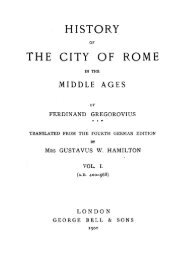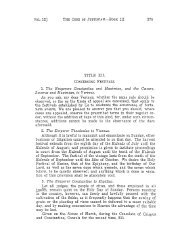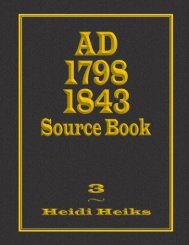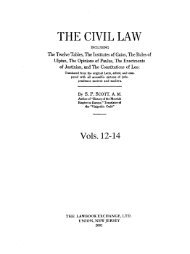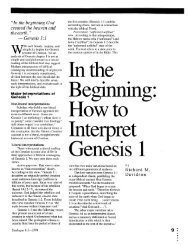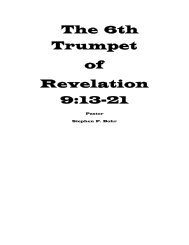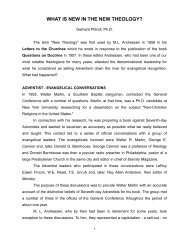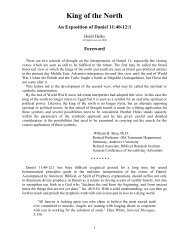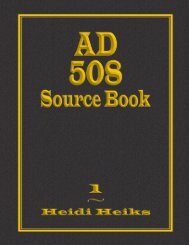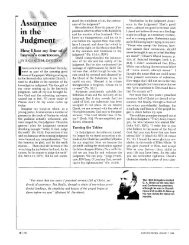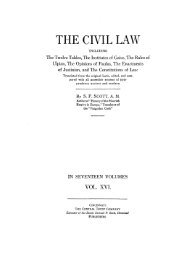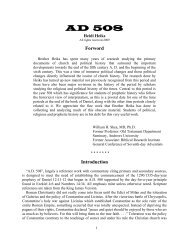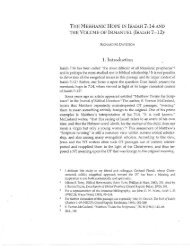You also want an ePaper? Increase the reach of your titles
YUMPU automatically turns print PDFs into web optimized ePapers that Google loves.
<strong>Judgment</strong> <strong>in</strong> <strong>Daniel</strong> 7God's People as Objects ofInvestigation Elsewhere <strong>in</strong> the OTIn this section a briefcomparison will be made between the judgmentdepicted <strong>in</strong> <strong>Daniel</strong> 7 and those judgments described elsewhere <strong>in</strong> the 0'[Old Testament judgments <strong>in</strong> general. It is a fact that <strong>in</strong> the OTjudgmentpassages more attention is directed toward Israel-the professedpeople of God-than toward the surround<strong>in</strong>g nations. For example,althoughJeremiah and Ezekiel (<strong>Daniel</strong>'s contemporaries) wrote large sectionsregard<strong>in</strong>g judgments on the nations (six and eight chapters respectively),it is to be noted that the bulk of their messages consisted ofjudgments upon God's people <strong>in</strong> Judah; that is, upon "the s<strong>in</strong>ners <strong>in</strong> Zion"(compare Isa 33:14). The same pattern and proportion ofattention is consistentthrough thejudgment passages recorded elsewhere <strong>in</strong> the0'[ Thusit would be expected that <strong>Daniel</strong>'s scene of f<strong>in</strong>al judgment would also <strong>in</strong>volvea separation of the false believer from the people of God as well asa judgment upon their enemies.Old Testament <strong>Judgment</strong>s from the sanctuary. When the judgmentsof God are specifically identified as com<strong>in</strong>g from God's sanctuary (theearthly tabernacle/temple or heavenly temple), two-thirds of these <strong>in</strong>stancesdirectly <strong>in</strong>volve God's own professed people. As noted <strong>in</strong> thechapteronjudgment<strong>in</strong>the 01;20 ofthe 28passages hav<strong>in</strong>g to dowithjudgmentfrom God's sanctuary specifically <strong>in</strong>volved a judgment of God's people.S<strong>in</strong>ce these passages naturally provide the background for the scene <strong>in</strong><strong>Daniel</strong> 7, and s<strong>in</strong>ce <strong>Daniel</strong> 7 represents an even greater example ofwhatthey have described on a smaller scale, it follows that God's people will be<strong>in</strong>volved <strong>in</strong> this ultimate judgment as well.Old Testamentjudgmentand thebooks. Another important po<strong>in</strong>t hasto do with the use of "books" or "scrolls" <strong>in</strong> the judgment of <strong>Daniel</strong> 7.God's book or books <strong>in</strong> heaven are mentioned six times <strong>in</strong> the 0'[The frrst two references come from the account ofMoses' <strong>in</strong>tercessionwith God on behalfofrebellious Israel at S<strong>in</strong>ai. Moses pleads with God andrequests that his own name be blotted from God's book ifIsrael cannot beforgiven (Exod 32:32). God responds by stat<strong>in</strong>g that the impenitent s<strong>in</strong>nerwould be blotted out of His book (vs. 33). Psalm 69:28 conveys the sameidea: The impenitent will be "blotted out ofthe book ofthe liv<strong>in</strong>g" (KJV).The reference to God's book <strong>in</strong> Psalm 139:16 expresses a positiveimage about it, s<strong>in</strong>ce God's <strong>in</strong>timate knowledge of His followers-<strong>in</strong>clud<strong>in</strong>geven the physical aspects of their be<strong>in</strong>g-are recorded there<strong>in</strong>. Asimilar idea is carried <strong>in</strong>to the world of the spiritual experience <strong>in</strong> Psalm147



